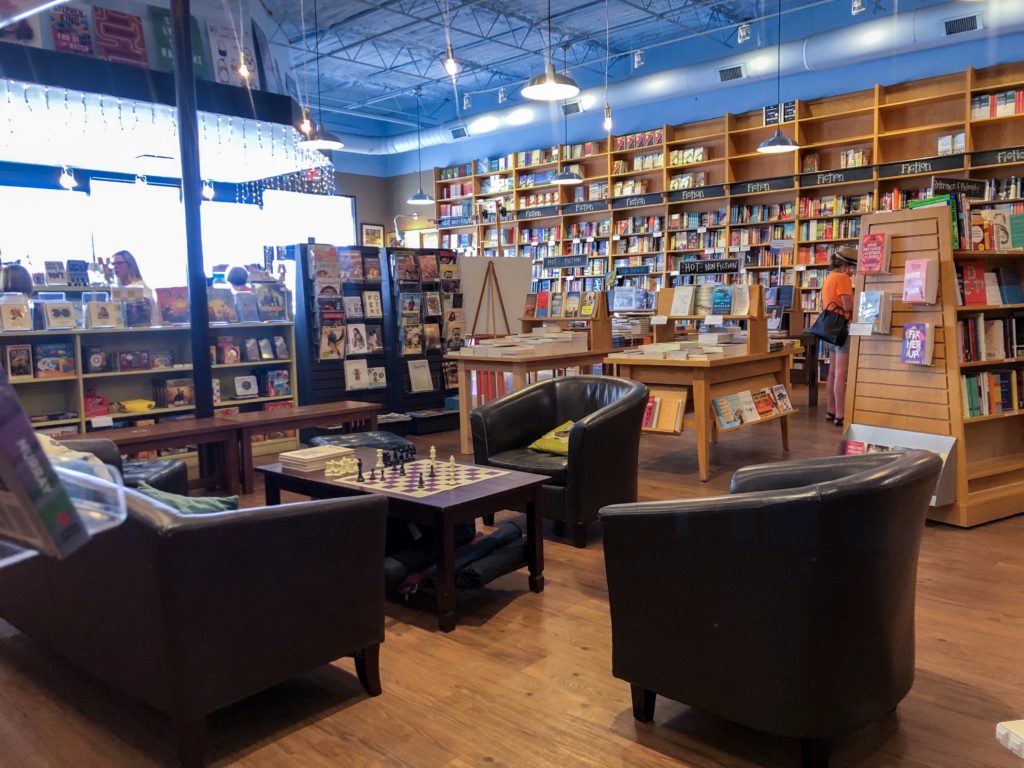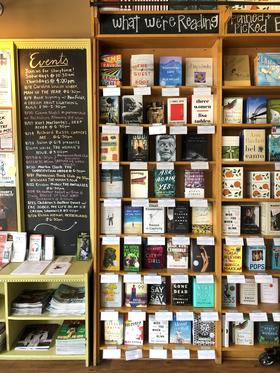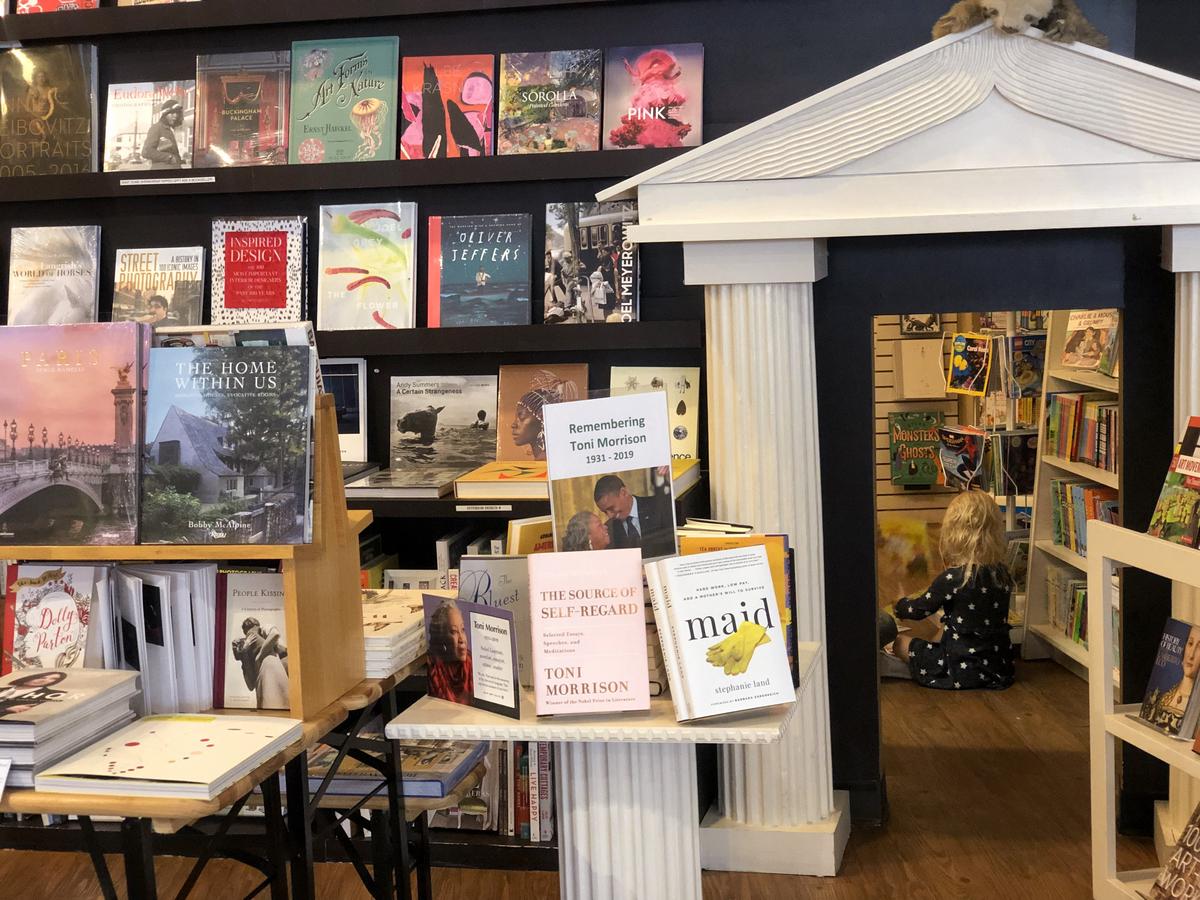
Amazon has taken out scores of mom-and-pop shops across the nation, and now, it’s putting pressure on a local favorite in Nashville. The company is opening a brick-and-mortar bookstore across the street from one of the city’s most beloved independent shops.
Parnassus Books looks smaller from the outside. When you enter the shop, with its modest storefront, it keeps stretching back past your line of sight.
It’s there, in a small office tucked into the corner, that Ann Patchett answers the always-ringing phone. Patchett is Parnassus’s co-owner, a bestselling author herself, and today, a customer service rep.
“Parnassus Books,” Patchett says to the customer on the phone. Then, after a pause, she continues, “It is so possible. It’s not just possible; it’s probable.”
Patchett decided to open this bookstore eight years ago, in large part because she couldn’t find a local place to carry one of her own novels. They’d all closed down. Desperate, she ended up talking her tailor into selling it.
“You could have your pants shortened and buy a copy of ‘State of Wonder.‘”
That was long before online retail giant Amazon made a second home in Nashville.
Now, the company is opening an Amazon Books location in the same neighborhood. Patchett says she’s up for the challenge.
“I sort of feel like, ‘OK, I’m going to put on the Joan of Arc suit and stand up for independent bookstores.'”
Books may have been around since before the Hundred Years’ War, but bookstores constantly come and go. And the industry has gone through immense changes over the past few decades.
Before the 1990s, almost every bookstore you’d come across was independent. Then came big-box names, like
Barnes & Noble, Borders and Books-A-Million. They pushed out one in three independent bookstores.
Later that decade, their momentum was slowed by the launch of Amazon. And for many big-box retailers, the kill shot came in 2007 – when Amazon launched the
Kindle e-reader.
As the stores went out of business, it created an opportunity for independent booksellers to rebound. Parnassus built itself from the rubble left behind. To some degree, literally. Parnassus salvaged lights and shelves from a closed-down Borders. (Full disclosure: Parnassus is a financial sponsor of WPLN.)
“In fact, the chairs that we use for events also came from my Borders store,” says Andy Brennan, the former manager of a local Borders and current manager of Parnassus.
Parnassus has thrived by focusing on boutique services like personalized recommendations, age- and interest-specific book clubs, and author events.

“In the first month that we were open, I think I brought those chairs out and set them up more times than I ever did in my six years at Borders,” Brennan says.
‘Store for the future’?
Across the country from Parnassus, there’s a similar shop called
University Bookstore. Pam Cady has been its manager for 38 years.
“I just love booksellers. I love books, and I love people who buy books,” Cady says. “It’s a great combination.”
Cady’s store in Seattle has been in business for more than a century, but five years ago, it found itself in Parnassus’ shoes. That’s when the very first Amazon Books opened half a mile away.
After some initial fear, Cady soon learned the only thing her shop had in common with Amazon’s new store was the “books” part of its name.
“Well, you walk in [an Amazon Books store], and it’s very tech-oriented. I think what their major thrust is, they want you to sign up for Amazon Prime. They get all of your information,” Cady says. “What I think what it really is, it’s like, ‘How can we design a store for the future?’ — for what they want the future to be.”
Amazon doesn’t disagree. The company declined to make anyone available to be interviewed, but they said in a statement that learning more about their devices is a big part of their brick-and-mortar business.
And, you can see that at existing Amazon Books locations. They look more like a Microsoft or Apple store. The selection is limited to top online sellers. There’s no staff recommendations. Placards feature snippets of reviews from Amazon.com.
Wall Street analysts say goal isn’t necessarily to sell books — but to draw in foot traffic for bigger buys like Alexa devices.

Connecting with younger readers
In the board book section of Parnassus, on any given Thursday, you can find a gathering of little ones listening with wide-eyed enthusiasm to a volunteer reader. On one Thursday, the kids had exclusively chosen dog-related books for weekly story time, and they got through half a dozen before playtime begins on the store’s popular train table.
Margaret Watson brought her 5-year-old.
“We were actually getting a cookie after school at the bakery next door, and Jack, my son, said he wanted to go to the bookstore,” Watson said.
Jack led the younger kids in a competition of who can get their train down the tracks fastest.
As a Nashville native, Watson takes her son to Parnassus to relive some of her own childhood spent at a since-closed independent bookstore across the street.
“I have really good memories of just being there and spending a lot of time there,” Watson said. “And, I love it here. It’s really nice.”
When Watson found out Amazon would soon be just feet away, she was concerned her and Jack’s favorite weekday stop would affected, but then, she thought about how much of a relief a trip to Parnassus can be for parents.
“It’s pretty easy to access, which is humongous if you have a child. Going to the mall is just …” Watson paused. “There’s no way we would do that after school.”
Amazon hasn’t given an opening date for its Books location yet. But, Parnassus says it’s here to stay.

